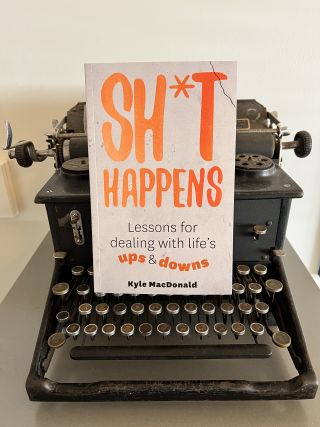Who Are You Really? An interview with the author of 'Sh*t Happens'

KEY POINTS-
- Human beings are the product of both nature and nurture.
- What happened to someone can have a profound impact on them.
- What people do with those experiences is the most important work they can do.

From your Myers-Briggs type to your Enneagram number to your astrological sign, it seems that the focus of modern self-help is the identification of your starting point. If you’re a Taurus, an Enneagram 8, or an INFJ, here’s who you will be in the world. It’s set in stone early, and the sooner you embrace and understand this foundational style, the better you’ll be able to navigate work, relationships, and life pursuits.
But those formulaic molds don’t take into account all the obstacles that life places in our path. Where does abuse or trauma fit in this system? What impact might family dynamics or the development of attachment styles have? What about our reactions to the inevitable roadblocks life sends our way? How do they impact us, how should we respond, and how does that impact our health in the long term?
Maybe who we become is not just about who we were at birth but also includes everything that happens to us from that point forward.
To clarify this, I spoke with Kyle MacDonald, a New Zealand psychotherapist with over 20 years of clinical experience across both the public and private sectors, about his book, Sh*t Happens: Lessons for Dealing With Life’s Ups & Downs.
Kyle has written a mental health column for the NZ Herald and co-hosts an award-winning mental health radio show, “The Nutters Club,” on NewstalkZB. He is currently on the Psychotherapy Board of Aotearoa New Zealand (PBANZ), served four years on the NZAP Council, and was awarded a Distinguished Service Award by the NZAP for his time promoting psychotherapy.
He is the founder and co-director of the Robert Street Clinic in Ellerslie and lives in Mount Eden, Auckland, with his partner and two daughters. We recently shared a lovely meal and an exciting radio show together in Auckland, and he told me more about his new book.
Ryan Howes: Does sh*t happen to us, or do we cause or invite the sh*t that is happening?
Kyle MacDonald: “Sh*t Happens” can seem to some like a cynical bumper sticker, a dismissal of pain and distressing events. But, actually, I’ve always thought it’s a great way to move towards acceptance, in that no matter how stable and trauma-free our life is, we will always hit a bump in the road. Relationships end, people we love die, and conflict arises—even pandemics or natural disasters hit.
Accepting that life involves pain and mishaps and, for some, profound trauma that just happens to all of us, it is vital to be able to overcome the setbacks and learn new and flexible ways of dealing with them.
RH: What made you decide to write this book?
KM: I’ve written a newspaper column and co-hosted a radio show here in New Zealand for about nine years, and so finding ways to be able to explain and translate the jargon-laden world of psychotherapy is something I’m passionate about. This book is largely driven by that desire—to make the ideas and theories of psychotherapy more accessible and hopefully helpful to a wider audience.
RH: What do you hope people will gain from this book?
KM: Well, it’s not a self-help book, but I certainly hope that it is helpful. In the book, I lay out what I call my “map” for how I think about therapy, as well as breaking down some of the cornerstones of psychotherapy—attachment, trauma, parenting, aging, and the meaning of it all. Along the way, people will hopefully learn more about the habits they’ve built up over time when it comes to managing their emotional responses and the sorts of problems we can get into when our emotions are dysregulated.
RH: You cover a wide variety of sh*t in this book, from childhood to emotions to relationships to meaning and purpose. Does this pretty much cover life, or is there more?
KM: There is always more! And one of the reasons this isn’t a self-help book is because there is no silver bullet, no one thing to do or practice that makes everything OK.
We’re always learning, unlearning, and relearning when it comes to coping with the sh*t life throws at us. The point, always, is not what happens to us but how we respond. And how we respond comes down to the flexibility of responses we have to our emotions—and the inbuilt flexibility we have as a species to learn new ways.
RH: You mention that balance is “when we are at peace with what is. It isn’t necessarily an absence of upset, emotion, pain, distress, or difficult life events, but an acceptance of them.” What is that? Don’t we want to avoid pain and distress?
KM: Avoiding pain is absolutely something we should do when we can, but a lot of pain in life is unavoidable—so what then? Trying to numb, ignore, or quell our pain with alcohol, drugs, or other damaging distractions causes more problems than it solves.
Learning to accept that sh*t happens, and rolling with it when it does, is one of the core lessons of this book. But the good news is (spoiler alert), and I hope my book shows you this, you don’t have to do it alone.
When it comes down to it, connections, love, and sharing our life with other people make the burden easier to carry and goes a long way towards answering, “What is the meaning of it all?”
- Questions and Answers
- Opinion
- Story/Motivational/Inspiring
- Technology
- Art
- Causes
- Crafts
- Dance
- Drinks
- Film/Movie
- Fitness
- Food
- Games
- Gardening
- Health
- Home
- Literature
- Music
- Networking
- Other
- Party
- Religion
- Shopping
- Sports
- Theater
- Wellness
- News
- Culture
- War machines and policy

